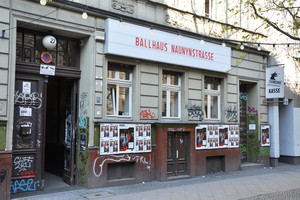Ballhaus Naunynstraße

Das Ballhaus Naunynstraße ist seit der Wiedereröffnung als translokales Theater durch Shermin Langhoff 2008 ein Kristallisationspunkt für Künstler*innen vorwiegend migrantischer und postmigrantischer Verortung. Die vom Ballhaus Naunynstraße ausgehenden neuen ästhetischen und inhaltlichen Impulse stießen einen Diskurs über postmigrantische Kulturproduktion an, die die deutschsprachige Theaterlandschaft nachhaltig veränderten. Der künstlerische Leiter und Geschäftsführer, Wagner Carvalho (gemeinsame Leitung mit Tunçay Kulao?lu von 2012/2013 bis 2014), stellt die Erweiterung postmigrantischer Perspektiven in den Mittelpunkt der programmatischen Ausrichtung, durch die Benennung verschiedener Perspektiven und Positionen wie der Schwarzen, Queerness sowie Gender werden gesellschaftliche Realitäten in ihrer Komplexität verhandelt. Die Nachwuchsförderung, Schaffung von Zugängen und Experimentierfeldern für junge Künstler*innen mit der „akademie der autodidakten“ sind wichtige Schwerpunkte.
Since its re-opening as a trans-local theatre by Shermin Langhoff in 2008, Ballhaus Naunynstraße is a focal point for artists who in the majority position themselves as migrants or post-migrants. New aesthetic and content-related impulses induced a discourse on post-migrant cultural production which has had a lasting impact on the German-speaking theatre scene. Wagner Carvalho, artistic director at Ballhaus Naunynstraße (together with Tunçay Kulao?lu 2012/13 until 2014) places the focus in the orientation of the programme on expanding post-migrant perspectives. By addressing various perspectives and positions such as the perspective of People of Color, queerness and gender, social realities are negotiated in their complexity. The work of Ballhaus Naunynstraße is not only dedicated to the continuation of post-migrant narratives but also set new priorities such as the promotion of young artists with the aim of creating new fields for experimentation for innovative artistic approaches.
